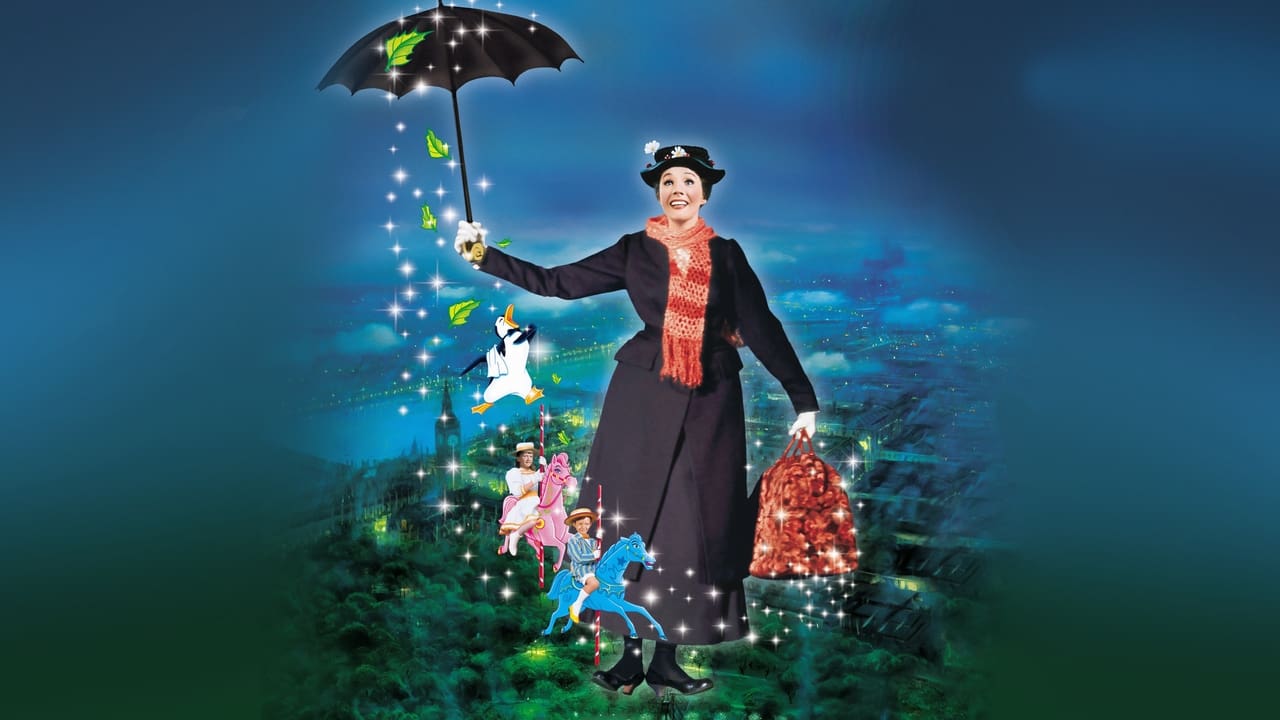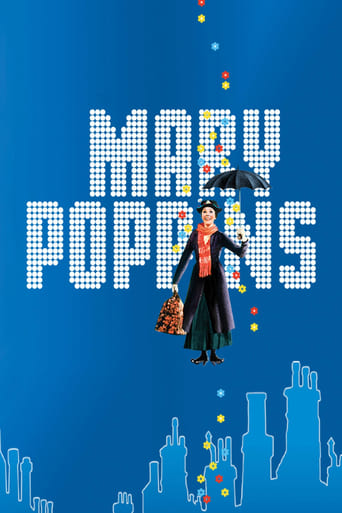BroadcastChic
Excellent, a Must See
Konterr
Brilliant and touching
Gurlyndrobb
While it doesn't offer any answers, it both thrills and makes you think.
daoldiges
The music and musical numbers are the real highlights of Mary Poppins, which is as it should be considering it is a movie musical. Its the remainder of the film that disappoints. Julie Andrews sings beautifully and sounds effortless in her musical executions, but while she does play a 'prim and proper' nanny I think her performance feels emotionless and a rather cold. The children are played very flat and one dimensional and don't bring the childlike energy and exuberance the roles require. I also found the film a bit long considering the material it had to work with. I do think Mary Poppins is worth checking out but I don't share the same enthusiasm that so many others feel for this film.
sbasu-47-608737
It could be called a very good movie, as fairy tale, and on that count there is no doubt of its merit. However it missed the punch point, and probably that's why the author, Ms Travers, wasn't too happy with it. Of course I am not sure that could be the reason of the relation having deteriorated so much, that Disney didn't even bother to invite her for premiere? That was not only disrespect, but an affront. But the studios, most of all this one, had that ego, and the 'master of all' attitude, so nothing too strange about it. Probably that was one of the reasons, the great Bernard Shaw publicly told, and carried it out too, that he won't have anything to do with Hollywood. The point won't have been missed, had that not been mentioned, and that too quite significantly, in the movie. It is I would say, all the male, head of family's lament, right or wrong, immaterial. That he grinds himself, to take care of the family, silently, whereas the family isn't, "cares" about him. That part is depicted well here too, the wife is a socializing woman, the children, probably due to his hard exterior, are scared of him. No one really dares, or cares, to enter his psyche. This isn't always his fault, but under the circumstances, he thought, he must be like this. To shatter this shell was important. This isn't the first, or only movie, where this subject is brought up. Philadelphia Story is another one of many. But in none of them, the solution, or even the right message is brought out, the conversion of the family, to melt the wall. This aspect had always been buried, and a passing remark, in the main story.But what happens when this is the raison d'etre of the tale? This particular fact was twice mentioned by Mary Poppins, with significance. But practically I couldn't find, the children doing much about that. The Mary Poppins series, was reportedly influenced by author's repentance, of not caring enough to help her father (who incidentally was too a banker, died while he was just in his early forties, reportedly demise hastened due to Alcoholism). Had they skipped to mention it, probably the movie won't have lost anything, in its story line. But retaining it, and doing nothing about it, really gives a wrong message, as if it is the father, who should break the mould itself. The Beast should become prince charming, without tears of Belle. Any good fairy tales should have an underlying message, for the children. Cinderella tells the children not to be despondent of the circumstances, with the persons who are kind (there would be a few), you could rise up. La Belle et la Bête teaches not to be overtly scared or affected by the exterior, there could be something exquisite underneath, to be discovered. Little Mermaid tells, for someone whom you really care, no sacrifice is enough. Like that this too had a message, in fact may be all of the above together, which the movie version missed.
James Hitchcock
Christmas is a time when the TV channels normally wheel out classic family movies, and this Boxing Day I caught "Mary Poppins", one of my favourite films as a child, but one which I had not seen for many years. The story is set in the London of 1910. Mary Poppins, a mysterious, magical figure blown in with the wind, takes a job as nanny to Jane and Michael, the children of George Banks, a well-to-do banker. Mr Banks hopes that Mary will reform his occasionally unruly children's behaviour, but it soon becomes clear that it is really their parents who need reforming. George, a stern Edwardian paterfamilias, pays more attention to his work than he does to his family, and his wife Winifred is too preoccupied with political good causes to have much time for her children. This was the film which Walt Disney tried to make for over twenty years. In the 1930s he had promised his young daughters that he would make a film of their favourite "Mary Poppins" books. For a long time, however, it appeared that Disney would be unable to fulfil his promise. The main obstacle was the author of the books, Pamela Travers, who disliked the idea of her books being filmed, especially by Disney whom she considered a vulgar showman; when she finally relented in 1961 it is said that she was prompted more by financial difficulties than by a genuine change of heart. The story of Disney's battle with Travers is told in the recent "Saving Mr Banks". I have not read Travers' books since my childhood, but I recall that her Mary was a rather strict middle-aged figure. Here she is played by Julie Andrews as young, beautiful, gentle and kind-hearted. Now it is a truth universally acknowledged in Hollywood, that a single woman in possession of youth, beauty, gentleness and a kind heart, must be in want of a husband, or at least a boyfriend. Universally acknowledged, that is, by everyone except Pamela Travers. Disney wanted to introduce a romance between Mary and Bert, the Cockney jack-of-all-trades played by Dick Van Dyke, but Travers resolutely vetoed this, so their relationship had to remain platonic. Two battles Travers fought and lost were over the Sherman Brothers' songs, which she disliked, and over the use of animation, which she loathed. (She was even badgering Disney to remove them during the party after the premiere; he replied laconically "Pamela, that ship has sailed", and walked away). I think we can be glad that she lost these battles. The musical score- cheerful, lively, witty and bursting with great tunes- is one of the film's best features; every time we saw it my sisters and I would be singing "Supercalifragilisticexpialidocious", "Feed the Birds" and "Chim-Chim-Cher-ee" for days. The Sherman Brothers, in fact, threw themselves energetically into their song-writing duties; they produced more than 30 original songs for the movie, most of which were never used. As for the animated sequences, they emphasise the fantastical, magical nature of the story, making it something more than just a mundane tale of London in the olden days. This is the film which made Julie Andrews, previously a well-known Broadway actress, into a huge international star. Her "Best Actress" Oscar must have been the most welcome form of consolation after her disappointment at being (controversially) passed over in favour of Audrey Hepburn for the role of Eliza in "My Fair Lady", a role which Andrews had created on Broadway. (The film as a whole was nominated for "Best Picture", the only such nomination Disney received in his lifetime). There are some good supporting performances, especially from David Tomlinson as George Banks, a man who beneath an outward mask of pomposity and severity is not quite the domestic tyrant he has always seemed. The weak link in the acting has traditionally been said to be Van Dyke, and this is one battle which I wished Travers had won. She wanted a British actor in the role, but Disney insisted on having someone familiar to American audiences. Van Dyke is good when it comes to dancing and general clowning around, but his attempt to sound like a Cockney has gone down in history as one of the worst cinema accents ever. Van Dyke could, in fact, do an acceptable British RP accent, as he shows in his cameo role as George's boss Old Mr Dawes, but our working-class and regional accents are notoriously difficult for American actors to imitate. Even Meryl Streep, Hollywood's resident dialect specialist, shied away from a West Country accent in "The French Lieutenant's Woman". The need to break the action occasionally so that people can break into song means that musicals generally take longer to tell their stories than "straight" films, and "Mary Poppins" is no exception. (Just think how lengthy it might have been had all those 30-odd songs made the final cut). The action does tend to flag in a few places; I felt that the "Uncle Albert" sequences went on a bit too long, both as a child and as an adult. Overall, however, it has stood the test of time well, and will doubtless entertain modern children as well as it did my generation. 8/10Some goofs. The robins we see "feathering their nest" are American Robins, a species not found in Britain. The European Robin, although it also has a red breast, is only distantly related to its American namesake. Also, there are no freshwater turtles in Britain.
dierregi
I may be in the minority here, but after having tried to endure the full 2 hours and 20 minutes of this as an adult, I fully understood why I never liked it much as a child. It is not focused on children but mostly on the grown-ups around them. Mary Poppins appears out of nowhere and leaves just as fast, dumping the children who got attached to her. Some of the songs seem completely unrelated to the story (the woman feeding the birds, etc…) and are quite sad, Mrs. Banks has almost no part of the story, Mr. Banks has way too much, but he seems a deranged character. There are too many song and dance numbers, some very loud, most overlong. Some scenes are irrelevant to the plot development (if there is any) and there is a lot of banking and old men, none in the least entertaining.The only part I liked was the one with the animation, which I just discovered, was the one the author (PL Travers) hated most. Actually, she hated the whole movie, but for reasons different from mine. Some may object that this movie got Oscars, to which I can just add that Oscars - now and in the past - do seem to be distributed randomly, or for politically correct reasons.

